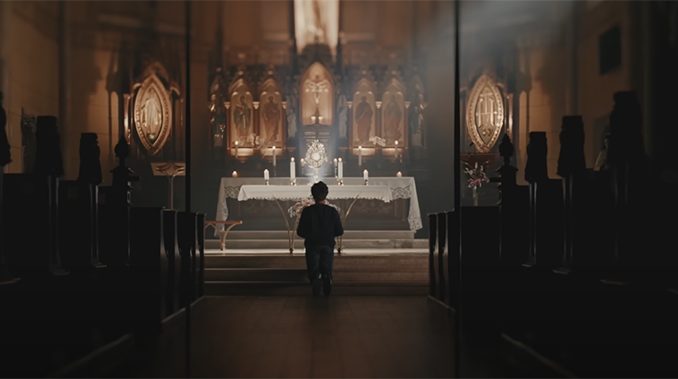
The Catholic Church will soon canonize its first millennial saint (the original date of April 27 has been postponed due to the death of Pope Francis).
Carlo Acutis was just 15 years old when he died in 2006, but as Pope Francis said, he showed “how possible it is in today’s world for young people to follow Jesus, share His teachings with others, and so find the fullness of life in joy, freedom, and holiness.”
In a Fathom Event on April 27, 28, and 29, viewers can take part in the celebration of this amazing young man by heading to theaters to see Roadmap to Reality, a film created by Wahl St. Productions and Castletown Media, in association with the National Eucharistic Congress, Inc. and Notre Dame’s McGrath Institute for Church Life.
Produced by Tim Moriarty, James M. Wahlberg, and Christian Surtz, this uplifting and inspirational film tells the story of a remarkable young man who had the unique ability to understand his faith on a level deeper than many adults. Carlo Acutis truly lived every moment for God, and not only will this film set your heart on fire for the Lord, but it will endear you to this young saint who loved God with his whole heart.
Roadmap to Reality opens by introducing viewers to young high schoolers who are about to embark on a device-free two-week trip to Rome. Sponsored annually by the University of Mary, this trip was unique because the students also had the privilege of traveling to Assisi to view Carlo’s body.
One of the stipulations of this annual pilgrimage is that students are only allowed a digital camera. All phones must be left in the US.
Monsignor James Shea, president of the University of Mary, explained the reasoning behind this policy: “The screen has become a counterfeit of the transcendent world. When screens become reality, and when you invest the whole of who you are into the careful cultivation of some kind of profile, we’re opening ourselves up to serious devastation.”
That devastation is evident in the declining mental health of today’s youth.
Sofia Carozza, PhD, a postdoctoral researcher at Harvard Medical School, and one of the film’s guests, explains that the addiction to phone use is detrimental to young people and that “rates of mental health problems [among adolescents] have been steeply increasing,” with 42% reporting feeling hopelessness, loneliness, and sadness.
As Monsignor Shea says, “This is not simply a question of mental health; it’s a question of the deepest possibilities of human life being neglected.”
When teens withdraw into themselves and spend hours a day on their phones, they abandon the human interaction we need to grow in faith and hope.
Carozza continues, “Without an awareness of an ultimate meaning that we can encounter, nothing can satisfy the human heart, and these symptoms will continue to arise.”
Life’s true meaning
Carlo understood that only God can truly satisfy the human heart. And though he lived before a time when cell phones were ubiquitous, he did grow up with the Internet, and he understood how addictive it could be. Yet he also understood that it could be used for evangelization. That’s one of the reasons he crafted a website documenting Eucharistic miracles.
Carlo knew the great gift of Jesus in the Eucharist, and he longed for others to share in the joy of this foretaste of heaven.
But he also shared so much more with those around him. The film includes incredible stories from his parents, from other family members, and from friends, all of whom attest to his holiness and his great love for God and his fellow man.
Carlo saw everyone through God’s eyes and treated each person he encountered with love, with dignity, and with kindness, giving his time and even his food to those who needed it.
Carlo understood that God created us as unique and unrepeatable individuals who were made to spend eternity with Him. But he also understood that we can become spiritually lost if we allow ourselves too little time in prayer and devotion to our faith. He once said, “We are all born as originals, but many die as photocopies.”
Carlo knew that if we allow ourselves to be caught up in the world and material things, including technology, we lose our identities as children of God and fail to understand the purpose for which we were made.
Tim Moriarty hopes viewers come to understand this purpose and shared with Celebrate Life Magazine, “In today’s scroll‑and‑compare world, screens tempt young people to flatten their identities into someone else’s highlight reel. Carlo points us to the antidote: Stay connected to the one true original, Christ present in the Eucharist, and you’ll discover the unique, unrepeatable mission God is calling you to.”
Human connections bring us closer to God
Throughout the film, viewers witness the joy of human connections—connections that are often lost when we spend so much time on mindless activities such as scrolling through our phones. Carlo’s life exemplifies the importance of living in the real world and directing our actions to other people. Only when we look outward can we evangelize and help others grow closer to God. That is what Carlo did every day of his life.
Carlo used to say, “Not I, but God.” He didn’t live so that others would glorify him. He lived so that others would glorify God. He understood that everything we do and everything we work toward must be aimed at growing closer to God and at attaining heaven. This is the roadmap that Carlo worked so fervently to teach others. He understood that technology is a substitution of reality, an imitation of the communion with others that sets us farther apart and that prevents us from working toward a life with God.
Carlo instinctively knew how to connect with people, including the impoverished and the forgotten. And he never shied away from lovingly teaching his friends the tenets of the faith—from the presence of Christ in the Eucharist, to chastity, to speaking out against the evils of abortion, to caring for others.
Carlo immersed himself in the world, taught the faith, loved others, gave of himself, and even converted many to Catholicism. He understood that he was living not for this world but for the next, and that guided his present.
As Fr. Shea explained, “Carlo’s life, his relatability, can draw people into a contemplation of these great questions about human life and meaning. . . . He’s an antidote to the ills of our age.”
And that is exactly the message the film wants viewers to comprehend.
Carlo once told a priest, “I like to think of how I can be a light to others.” His life beautifully exemplifies this desire. And in Roadmap to Reality, we see the joy of a life well lived because it was lived purposely for God.
• After you watch the film, explore further the remarkable life of Carlo Acutis with St. Carlo Acutis: Extraordinary in the Ordinary, a downloadable lesson from the Culture of Life Studies Program.
If you value the news and views Catholic World Report provides, please consider donating to support our efforts. Your contribution will help us continue to make CWR available to all readers worldwide for free, without a subscription. Thank you for your generosity!
Click here for more information on donating to CWR. Click here to sign up for our newsletter.









